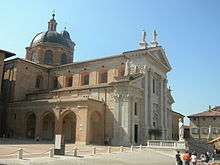Roman Catholic Archdiocese of Urbino-Urbania-Sant'Angelo in Vado
| Archdiocese of Urbino-Urbania-Sant'Angelo in Vado Archidioecesis Urbinatensis-Urbaniensis-Sancti Angeli in Vado | |
|---|---|
 Urbino Cathedral | |
| Location | |
| Country | Italy |
| Ecclesiastical province | Pesaro |
| Statistics | |
| Area | 781 km2 (302 sq mi) |
| Population - Total - Catholics |
(as of 2010) 54,900 50,500 (92%) |
| Parishes | 54 |
| Information | |
| Denomination | Catholic Church |
| Rite | Roman Rite |
| Established | 6th century |
| Cathedral | Basilica Cattedrale di S. Maria Assunta (Urbino) |
| Co-cathedral |
Concattedrale di S. Cristoforo Martire (Urbania) Basilica Concattedrale di S. Michele Arcangelo (Sant'Angelo in Vado) |
| Current leadership | |
| Pope | Francis |
| Archbishop | Giovanni Tani |
| Emeritus Bishops | Francesco Marinelli |
| Map | |
 | |
| Website | |
| www.arcidiocesiurbino.it | |
The Archdiocese of Urbino-Urbania-Sant'Angelo in Vado (Latin: Archidioecesis Urbinatensis-Urbaniensis-Sancti Angeli in Vado) is a Roman Catholic ecclesiastical territory in the Marche, central Italy, created in 1986. In that year the historical Archdiocese of Urbino was combined with the Diocese of Urbania-Sant’Angelo in Vado. In 2000 the archdiocese lost its status as metropolitan see, and it is now a suffragan of the Archdiocese of Pesaro.[1] The current archbishop is Giovanni Tani, appointed in June 2011.
History
Urbino is the ancient Urbinum Mataurense, a Roman municipium. Urbino was held by the Ostrogoths from the late 5th century, but was captured by Belisarius (538). Under Pepin the Short it became part of the pontifical domain.
The first known bishop of Urbino is Leontius, to whom Gregory the Great gave the diocese of Rimini (592). Other bishops were:
- Theodoricus, who in 1021 transferred the cathedral within the city (the ancient cathedral was outside);
- Blessed Mainardo (1057).
- Under Bishops Egidio (1288) and Carrado, O. S. A. (1309), Blessed Pelnigotto, a Franciscan Tertiary, and Blessed Clare of Rimini lived in the city.
- Marco Boncioni, (1342); Fra Bartolomeo Carusi, (1347), theologians.
- Under Francesco, (1379), the hermitage of the Gerolamini on Monte Cesana was established;
- Oddone Colonna (1380), later Pope Martin V;
- Gian Pietro Arrivabeni (1491), learned writer and restorer of discipline;
- Cardinal Gregorio Cortese, (1542);
- Felice Tiranni (1551), reformer of religious life.
In 1563 Pope Pius IV made Urbino a metropolitan see, with the following suffragans:
- diocese of Cagli
- diocese of Sinigaglia
- diocese of Pesaro
- diocese of Fossombrone
- diocese of Montefeltro
- diocese of Gubbio.
Later also:
Under Antonio Giannotti (1578) the seminary was opened; Ascanio Maffei (1646) restored many churches; Ignazio Ranaldi (1819), restored the discipline of the seminary and the religious orders.[2]
Notes
![]() This article incorporates text from a publication now in the public domain: Herbermann, Charles, ed. (1913). Catholic Encyclopedia. New York: Robert Appleton.
This article incorporates text from a publication now in the public domain: Herbermann, Charles, ed. (1913). Catholic Encyclopedia. New York: Robert Appleton.
| ||||||
Coordinates: 43°43′31″N 12°38′14″E / 43.7252°N 12.6372°E